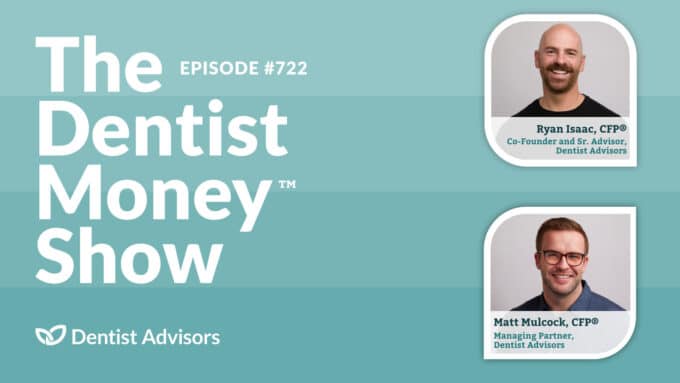Executive Summary
Each of us has an optimal path for wealth creation given our backgrounds, strengths, and interests. Because most advisors are paid to sell products, traditional financial planning focuses almost exclusively on putting discretionary income to use, with very little to say in the realm of career / business advice. But people who retire early are usually the people with the highest lifetime earnings, not the people who earn the highest returns.
The most successful people learn how to say “no” far more than they say “yes.” I’m not talking about saying “no” to the obvious stuff—like investing in an unrelated side-business early in the development of your practice. I’m talking about saying “no” to the really hard stuff—the opportunities that are legitimately good. But in today’s highly specialized and competitive climate, you have to focus on the “best” opportunities and pass up on the “good” ones.
In addition, you’ll find the most successful dentists have the appropriate level of liquidity—personally and in their practice. This ability to quickly access capital gives them the mental ability to say “no” more frequently than they otherwise could. Being tight on cash pressures you to say “yes” when you might otherwise say “no.”
If you feel stuck financially, it’s likely due to your inability to say “no” and “yes” at the right times. As you build up the right levels of liquidity, you’ll be able to make critical career decisions without pressure.
The Big Choices that Influence Your Entire Life
You’re at home, kicking back in your favorite chair after a long day of back-to-back patients. With how packed your production schedule is, you don’t get as much time to work on the business. Even as you start to wind down, the wheels are still turning.
“How much dentistry do I want to produce myself? Should I add another associate or pare down and just focus on higher income procedures?”
“I know money isn’t everything, but I want a comfortable lifestyle. Should I focus on building a lifestyle practice, or should I push towards a multi-location growth engine to sell to private equity when the timing is right?”“There are so many different ways to build my practice—I just want to make sure I enjoy what I’m doing and make the right decision for me and my family.”
Are you clear on what you’re trying to build? Or, are you being thrown around by all the opportunities coming at you? Each dentist has a unique combination of knowledge, experience, risk preferences, and life goals. Some opportunities will accentuate your strengths and push you towards an optimal, personal outcome. Other opportunities clutter up your life with unnecessary complexity.
What Do You Mean By Opportunities?
The types of opportunities I’m worried about are any unnecessary commitments of time or money at the wrong time in your career. These opportunities can be lifestyle expenses like a nicer home, a new car, or a cabin. It might be an additional practice location, investing in a startup business, a commercial or residential real estate project, or even new equipment. None of these are
bad. In broad terms, unnecessary opportunities are anything that distracts you from following your optimal, personal path.
The most successful people focus relentlessly on their unique path. Steve Jobs had something to say about focus that I really like.
Your path towards deeper focus won’t be perfect—it’s a journey of discovery as you make mistakes…and enjoy victories. Your optimal path will be different from mine, and different from that of your friends in dental school. But learning to say “no”—even to what seems like a good opportunity—is an essential skill.
The ideal path is focused, and organically reveals itself through persistent hard work. It’s not an “idea” that you come up with, or that someone throws at you. The ideal opportunities often feel more like the next puzzle piece that helps add context to the existing picture.
Warren Buffett said: “The difference between successful people and really successful people is that really successful people say no to almost everything.”
Liquidity Is the Result of Saying “No” and the Key to Saying “No” Again
Even though we all choose different business models (associate, lifestyle practice, large DSO, etc.), there’s a common thread that can help all of us stick to our guns. It’s our liquidity. Liquidity is cash in personal checking, cash in business checking, or after-tax investments (mutual funds, ETF’s, etc.) that can be accessed within a few days without a tax penalty.
Liquidity results from saying “no” to dozens of things you could have done (investmentor lifestyle opportunities). People who learn to say “no” effectively have more cash and liquid investments, and healthier practices.
Having ample liquidity is critical to building the future you want. I often recommend building liquidity before paying down debt or investing too heavily in long-term assets. Why? Because liquidity is the ammunition that gives you license to say “no” and build an optimal path. It allows you to relax, think more long-term about wealth building, and make “yes” and “no” decisions without unnecessary pressure.
In most cases, when finances are tight, you react to your environment and say yes when you should have said no. You make short-term, stupid decisions that limit your ability to say “yes” when the right time arrives. Like passing up on a once-in-a-lifetime hire at the practice because you don’t feel like you can afford them. Or bringing on the right associate at the right time to leverage you to a higher income and higher equity value.
The person who has $250,000 of liquid assets as opposed to $250,000 of home or business equity is more likely to take advantage of these game-changing moments. Have you ever said “yes” to something that unfortunately put the best thing out of reach? Because your time and resources are limited, every opportunity comes at the cost of another opportunity.
Right Opportunity, Wrong Time
Sometimes an opportunity is great, but it’s just presented to us at the wrong time. Have you ever done something that felt like a once-in-a-lifetime opportunity, but it turned out to be more of a routine opportunity that would have been there at a later point in time, and with a lot less stress? It takes a lot of maturity to admit to something like that.
In my experience, most practice-owners don’t have adequate liquidity to meet their growth goals. In the vast majority of cases, dentists often rob themselves of precious amounts of liquidity to try and take advantage of opportunities that are not essential, or “once-in-a-lifetime.”
A less “expensive” opportunity might be just fine, and have no negative side effects, but too often dentists leave themselves with too little money to pursue their optimal financial path because they chase once-in-a-lifetime opportunities that really are just routine. Then, instead of being in a position of financial independence in the latter stages of their careers, they spend a lot of time playing catch up.
If you feel stuck financially, or stressed out, it’s likely due to your inability to say “no,” which is causing you to have an inadequate amount of liquidity. Plain and simple.
Some People Are Too Liquid and Never Say “Yes”
Just because you’re good at saying “no” doesn’t mean you’re good at saying “yes.” I know some dentists who struggle because they have too much uninvested cash in the bank. They’re worried about investing it back into their practice, real estate, retirement accounts, or stock and bond funds. Although this is the minority of dentists, it does happen (and you know who you are if you’re reading this).
If you’re in that minority group, congratulations on learning how to say “no!” But you might be starving your business for essential expansionary investments that would unlock greater and greater value for your personal wealth, better service for your patients, and a more relaxed lifestyle. Over time, cash in the bank will never be as productive as money invested inside or outside of the practice (in the appropriate “yes” investments).
The right mix between liquidity, retirement accounts, real estate, and business value is critical to living a balanced life and growing your net worth at an optimal rate.
So How Much Liquidity Do I Need?
Liquidity relieves stress. By relieving yourself from financial stress—your relationships, career, and physiological stress symptoms will be more bearable. Getting the right mix of liquidity in your personal balance sheet is critical. It’s a highly personal decision, and very specific to the level of wealth you’re trying to accumulate. You and your financial advisors should be very
interested and thoughtful about what it means to have too much, or too little.
I view liquidity as a relative measure. That just means that someone with a large business and higher personal spending will need more cash and liquid investments than someone with a very small business and low levels of personal spending in order to feel a similar stress relief.
In our business, we measure relative liquidity through a ratio we call Liquid Term (it’s one of the Elements® we calculate). Here’s the formula:
Liquid Assets / Annual Personal Spending = Liquid Term
Your Lt should increase with time as your personal spending and business overhead also increases. It will go from a 0 (scary) to a 2 – 3 (stable), then 5+ (secure), to as high as 30+ (financial independence).
Ample liquidity is MORE important than minimizing interest expense. It may not seem “financially smart” to build a six month emergency fund in a bank account yielding far less than your student loans (which may be costing you as much as 7%), but it is the optimal solution to maintain overall financial health.
By following a liquidity-first path, you maximize your options and increase your ability to make those decisions at the right time. Making proactive financial decisions that grow your net worth are far more important than minimizing interest expense.
Conclusion
Remember, you have an optimal career path given your background, strengths, and interests.
Finding that path is a process of learning to say “no” to a lot of distracting opportunities. You have to focus on the “best” opportunities, and pass up on the good ones.
You’ll learn to see how certain opportunities build on your strengths and accelerate your momentum. Having the appropriate level of liquidity is essential to achieving that optimal point of momentum where your overall wealth is great enough to make work optional.
If you feel stressed out about money, it may be a simple case of not have enough liquid assets for the size of practice and personal spending that you’re used to. As you build up the right levels of liquidity, you’ll be able to get in the zone, calm down, and make decisions with more clarity and with less pressure.







